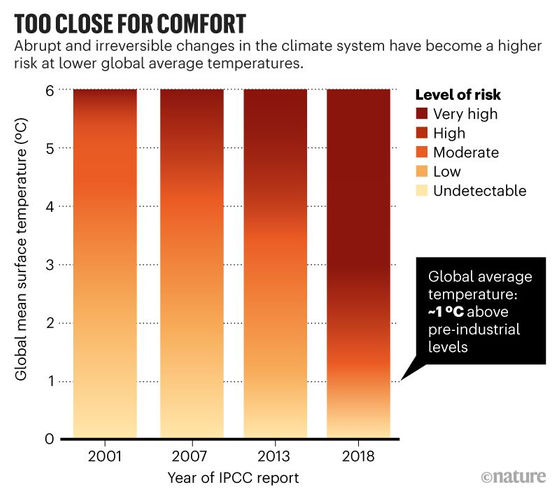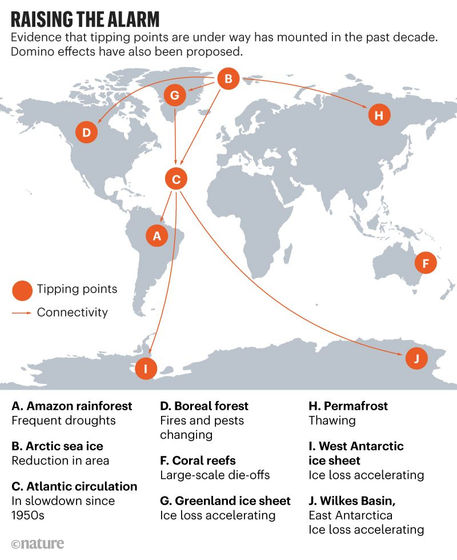There is a possibility that the global environment has come to 'where it can no longer return'

by
Climatologists warn that the ever-increasing climate change is approaching a “ turning point ” that will bring irreversible changes to the global environment.
Climate tipping points — too risky to bet against
https://www.nature.com/articles/d41586-019-03595-0
In previous studies, if the average global temperature rose 5 degrees before the Industrial Revolution, it was thought that a “turning point” would come where the melting of ice and deforestation could not be stopped. The goal was to keep the average temperature rise to about 3 degrees in consideration of the burden on the environment. However, the Intergovernmental Panel on Climate Change (IPCC) published a 1.5 degree special report published in October 2018: `` To stop the rise in average temperatures that would cause rapid and irreversible changes in climate, It must be kept in place, ”suggesting and overturning the theory. In 2015, the observation record that “average temperature is one degree higher than before the Industrial Revolution” has already been confirmed.

Events that are considered “turning points” of climate change due to global warming are progressing all over the earth simultaneously. The inflection points shown in the following maps are in order: 'A: Frequent droughts in the Amazon rainforest', 'B: Reduction of the ice area in the Arctic Ocean', 'C:

For example, if the temperature of the ocean rises by 2 degrees, 99% of tropical corals will be killed, combined with the effects of ocean acidification and water pollution caused by it, and already in Australia's Great Barrier Reef Coral bleaching and shoal coral death are ongoing.
Also, in the Arctic and Antarctica, ice is melting at an accelerated rate, especially on the Greenland ice sheet, large-scale defrosting has been confirmed that has not occurred several times over the past 1000 years .
Melting of the Greenland ice sheet is accelerating under the influence of heat waves-gigazine

The impact of climate change extends not only to the polar regions but also to temperate regions. Northern forests on the Eurasian and North American continents are changing from carbon sinks to carbon sources due to large-scale fires. Similarly, the Amazon rainforest, inhabited by one-tenth of the known species, has been declining due to recent large-scale fires and deforestation, which has a significant impact on the global environment and ecosystems. There are concerns.
Amazon may burn at a record speed and have a devastating impact on climate change-GIGAZINE

Timothy Renton, Director of the Global System Research Institute at Exeter University, said, “The time to prevent the arrival of the“ turning point ”is close to zero, and it has been 30 years to realize zero emissions that suppress carbon dioxide emissions. 'It may be too late considering that, in any case, the stability of the Earth is at stake, and international action, not words, is needed.'
Related Posts:
in Science, Posted by log1l_ks







